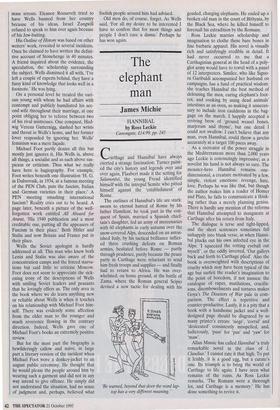Politically most incorrect
Michael Coren
THE HISTORY OF MR WELLS by Michael Foot Doubleday, £20, pp. 317 There is an anecdote concerning H. G. Wells that speaks volumes about the man and chapters about this biography of him. George Orwell had invited Wells round for dinner and had found out that his guest's favourite dessert was plum pudding. Orwell and his wife prepared one specially. Later that night, after the dinner, Wells became ill. He spent the following week explaining to friends that George Orwell had poisoned him with a plum pudding. In other words, Wells had vehement, blind and sometimes hilarious conviction that he was always correct and he often refused to believe the truth even when it was obvious.
From H. G. Wells to Michael Foot's biography of him. Declarations first. I became involved in something of a public squabble with Foot when my life of Wells was published in 1992. I wrote then that H. G. Wells was a racist, an anti-Semite, a plagiarist, a crass exploiter of women and a social engineer of manic proportions. I said that he also wrote some extremely good books but that those concerned with poli- tics, such as Anticipations and A Modern Utopia, were manifestos of a future dark age and that for far too long Wells had got away with it.
He envisaged and encouraged a society where government murder would 'take place and where 'these swarms of black and brown and dingy white and yellow people who do not come into the needs of efficien- cy . . . will have to go'; where Jews were so unacceptable that Leon Gelman, President of the Mizrachi Organisation of America protested against Wells' visit to the United States with 'H. G. Wells is brazenly spread- ing notorious lies about the Jews. His vio- lent language betrays a streak of sadism that is revolting.' Wells advocated 'scientifi- cally caused pain', concentration camps and mass arrests. Eleanor Roosevelt tried to have Wells banned from her country because of his ideas, Israel Zangwill refused to speak to him ever again because of his Jew-baiting.
His Outline of History was based on other writers' work, revealed in several incidents. Once he claimed to have written the defini- tive account of Stonehenge in 40 minutes. A friend inquired about the evidence, the speculation, the scholarship surrounding the subject. Wells dismissed it all with, 'I've left a couple of experts behind, they have a fussy kind of knowledge that looks well in a footnote.' He was lying.
On a personal level he treated the vari- ous young with whom he had affairs with contempt and publicly humiliated his sec- ond wife throughout their marriage, at one point obliging her to referee between two of his rival mistresses. One conquest, Hed- wig Verena Gatternigg, slashed her wrists and throat in Wells's home, and her former lover responded by ignoring her. Wells' feminism was a mere façade.
Michael Foot partly denies all this but mostly just ignores it. His Wells is, above all things, a socialist and as such above sus- picion or criticism. Thus what we really have here is hagiography. For example, Foot writes beneath one illustration 'H. G. in Dubrovnik, in 1934, at a famous meeting of the PEN Club, puts the fascists, Italian and German varieties in their place.' A PEN meeting smashing international fascism? Reality cries out to be heard. A page later, beneath a picture of the well- forgotten work entitled All Aboard for Ararat, 'His 1940 publication and a most creditable one, putting all the appeasers of Fascism in their place,' Both Hitler and Stalin and now Britain and France put in their place.
Wells the Soviet apologist is hardly addressed at all. This man who knew both Lenin and Stalin was also aware of the concentration camps and the forced starva- tions but said little to criticise Moscow. Foot does not seem to appreciate the sick- ening irony of the descriptions of Wells with smiling Soviet leaders and peasants that he lovingly offers us. The only area in the book where we do learn anything new or reliable about Wells is when it touches on his relationship with Michael Foot him- self. There was evidently some affection from the older man to the younger and much reverence flowing in the contrary direction. Indeed, Wells gave one of Michael Foot's books an extremely positive review.
But for the most part the biography is bewilderingly callow and naive, in large part a literary version of the incident when Michael Foot wore a donkey-jacket to an august public ceremony. He thought that he would please the people around him by wearing such a garment and did not in any way intend to give offence. He simply did not understand the situation, had no sense of judgment and, perhaps, believed what foolish people around him had advised.
Old men do, of course, forget. As Wells said, 'For all my desire to be interested I have to confess that for most things and people I don't care a damn.' Perhaps he has won again.











































































 Previous page
Previous page